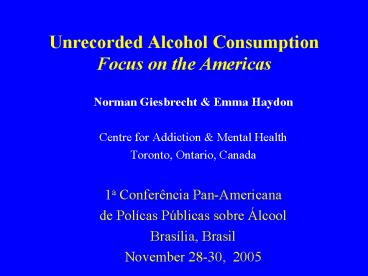Unrecorded Alcohol Consumption Focus on the Americas
1 / 20
Title:
Unrecorded Alcohol Consumption Focus on the Americas
Description:
St. Lucia 10.5. Bahamas 9.2. Venezuela 8.8 2.0. Argentina 8.6 1.0. U.S. 8.5 1.0 ... St. Kitts 7.6. Grenada 7.4. Uruguay 7.0 2.0. Barbados 6.7 - 0.5 ... –
Number of Views:19
Avg rating:3.0/5.0
Title: Unrecorded Alcohol Consumption Focus on the Americas
1
Unrecorded Alcohol ConsumptionFocus on the
Americas
- Norman Giesbrecht Emma Haydon
- Centre for Addiction Mental Health
- Toronto, Ontario, Canada
- 1a Conferência Pan-Americana
- de Polícas Públicas sobre Álcool
- Brasília, Brasil
- November 28-30, 2005
2
Topics
- Implications
- Dimensions
- Sources of information
- Estimates
- Contributing factors
- Policy implications
- Interventions
- Recommendations
3
Implications of Unrecorded Alcohol Consumption
- Accuracy of drinking volume estimates
- studies of associations between consumption
harm (or benefits) from alcohol - impact of interventions
- cross-sectional and longitudinal research
- drinking patterns
4
Implications of Unrecorded Alcohol Consumption
(2)
- Heavy consumption high risk drinking
- Easy access to untaxed alcohol
- High risk patterns
- Addition versus substitution
- Alcohol of questionable quality
5
Implications of Unrecorded Alcohol Consumption
(3)
- Alcohol Policy
- Reduce revenue for the state
- Reduce profit for producers
- Distributors with compromised role re illegal
alcohol - Rational to undermine control measures
6
Dimensions of Unrecorded Alcohol Consumption
- Legal
- home production of legal amounts
- consumption of non-beverage ethanol
- importation of legal amounts
7
Dimensions of Unrecorded Alcohol Consumption (2)
- home production of illegal quantities
- sale of home produced alcohol
- mass produced illegal alcohol
- smuggling
- individuals
- large-scale operations
- Illegal
8
Sources of Information
- Seizures by customs officials
- Police activities seizures
- Liquor inspector activities
- Cross-border traveler activity extrapolations
- Extrapolations using official statistics
- Self-reports
9
Sources of Information
- Caveats challenges
- Useful method varies by country, region and time
period - Vested interests in the estimation process
- No one method produces comprehensive estimates,
some only are based on a fraction - Challenge of comparing combining divergent
estimates
10
Americas Recorded plus estimated Unrecorded
- Bermuda 12.9
- St. Lucia 10.5
- Bahamas 9.2
- Venezuela 8.8 2.0
- Argentina 8.6 1.0
- U.S. 8.5 1.0
- Canada 8.3 2.0
- St. Kitts 7.6
- Grenada 7.4
- Uruguay 7.0 2.0
- Barbados 6.7 - 0.5
- Paraguay 6.7 1.5
- St. Vincent 6.7
- Haiti 6.5 0
- Dom. Republ 6.1 1.0
- Panama 6.0 1.5
- Chile 6.0 2.0
Litres of absolute alcohol per capita aged 15
Recorded FAO 2003 Unrecorded estimates for after
1995 from Rehm Gmel 2001
11
Recorded plus estimated Unrecorded (2)
- Columbia 5.9 2.0
- Guyana 5.8 2.0
- Suriname 5.8 0.0
- Costa Rica 5.5 2.0
- Brazil 5.3 3.0
- Peru 4.7 1.0
- Mexico 4.6 3.0
- Belize 4.5 2.0
- Guam 4.5
- Cuba 3.7 2.0
- El Salvador 3.5 2.0
- Bolivia 3.4 3.0
- Jamaica 3.4 1.0
- Trinidad
- Tobago 3.2 0.0
- Nicaragua 2.5 1.0
- Honduras 2.3 2.0
- Ecuador 2.0 1.0
Litres of absolute alcohol per capita aged 15
Recorded FAO 2003 Unrecorded estimates for after
1995 from Rehm Gmel 2001
12
Americas Recorded Estimated Unrecorded Alcohol
Consumption
- Recorded consumption
- 1.99 to 12.92 litres per capita aged 15
- Estimated unrecorded consumption
- minus 0.5 to plus 3.0 litres per capita 15
- Unrecorded as a of total (recorded plus
estimated unrecorded) - 11 to 55
13
Traditional local beveragesSelected countries
in Latin South America
- Honduras - Aguardiente
- Mexico - Pulque 7
- Paraguay - Abati
- Peru - Pisco, Chicha
- Suriname - Borgoe 38
- Trinidad
- Tobago - Babash
- Uruguay - Cana 38
- Venezuela - corn liquor
- Argentina - local beer 7
- Bolivia - Chicha 5-7
- Brazil - Cachaça 38-54
- Chile - Pisco 35
- Columbia - Rum 28
- Costa Rica - Guaro
- Ecuador - Aguardiente 40-70
- Guatemala - Chicha
- Guyana - Ti punch
These are examples not a comprehensive list
of beverages.
14
Contributing Factors
- Restrictions on access to legal alcohol sales in
host country - Price, outlet density, hours of sale
- Inter-country differences in access to alcohol
- lower prices in adjacent jurisdictions
- high volumes allowed for legal personal
importation
15
Contributing Factors (2)
- Traditional and local beverages
- extensive tradition and quality
- Smuggling of other goods
- Tobacco from US to Canada in early 1990s
- Tolerance for illegal behaviour
- among general population
- among legal distributors or producers
- Geography and population density
16
Policy Implications
- Legal illegal trade (particularly smuggling)
used to justify proposed erosion of control
policies - questionable estimation procedures used
- Resource management inter-sectorial
collaboration - Impact on traditional and local beverages
- Quality control issues harm reduction
17
Interventions
- Process
- Training
- Coordination
- International symposia
- Resource issues
- Data collection
- Outcome oriented
- Public education
- Mass media
- Warnings to distributors
- Inspections
- Law enforcement
- Enhance legal outlets
- Review of alcohol policies
18
Recommendations
- Use multiple methods for data collection
- Subject estimates to peer review
- Consider cultural aspects and norms re
traditional and local beverages - Consider impact of unrecorded alcohol on high
risk drinking dependence
19
Recommendations (2)
- Coordinate control/interventions of unrecorded
with harm reduction management of recorded sales
of alcohol - Build on evaluations of alcohol policies to
develop interventions to manage unrecorded
alcohol - Conduct routine monitoring evaluation of
interventions
20
Acknowledgements
- Sunny Ba, Guilherme Borges,
- Mariana Cremonte, Laura Krech, Maristela
Monteiro, Jürgen Rehm, Robin Room Maria Luiza
Segatto































